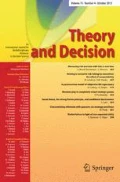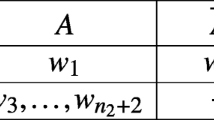Abstract
The justification of Bayes' rule by cognitive rationality principles is undertaken by extending the propositional axiom systems usually proposed in two contexts of belief change: revising and updating. Probabilistic belief change axioms are introduced, either by direct transcription of the set-theoretic ones, or in a stronger way but nevertheless in the spirit of the underlying propositional principles. Weak revising axioms are shown to be satisfied by a General Conditioning rule, extending Bayes' rule but also compatible with others, and weak updating axioms by a General Imaging rule, extending Lewis' rule. Strong axioms (equivalent to the Miller–Popper axiom system) are necessary to justify Bayes' rule in a revising context, and justify in fact an extended Bayes' rule which applies, even if the message has zero probability.
Similar content being viewed by others
REFERENCES
Alchourron, C.E., Gärdfenfors, P. and Makinson, D. (1985), On the logic of theory change: partial meet contraction and revision functions, Journal of Symbolic Logic 50, 510–530.
Billot, A. and Walliser, B. (1999), A mixed knowledge hierarchy, Journal of Mathematical Economics 32, 185–205.
Bradley, R. (1997), More triviality, Journal of Philosophical Logic 28(2), 12–139.
Cox, R.T. (1946), Probability, frequency and reasonable expectations, American Journal of Physics 14, 1–13.
Darwiche, A. and Pearl, J. (1997), On the logic of iterated belief revision, Artificial Intelligence 89, 1–29.
Friedman, N. and Halpern, J.Y. (1994), A knowledge-based framework for belief change, Part II: revision and update, in: J. Doyle, E. Sandewall and P. Tomasso (eds), Principles of Knowledge Representation and Reasoning, Proc. Fourth International Conference KR'94., 190–201.
Gärdenfors, P. (1982), Imaging and Conditionalization, The Journal of Philosophy 79, 747–760.
Gärdenfors, P. (1988), Knowledge in Flux, MIT Press, Cambridge, MA.
Gärdenfors, P. (1992), Belief revision: An introduction, In P. Gärdenfors ed.: Belief Revision, Cambridge University Press, 1–28.
Gärdenfors, P. and Sahlin, N.E. (eds) (1988), Decision, probability and utility, selected readings, Cambridge University Press.
Grahne, G. (1991), Updates and counterfactuals. In J. Allen, R. Fikes and E. Sandewall (eds), Proc. International Conference KR'91, 269–276.
Heckerman, D.E. (1988): An axiomatic framework for belief updates, In J.F. Lemmer, L.N. Kanal (eds), Uncertainty in artificial Intelligence 2, North Holland, Amsterdam, 11–22.
Katsuno, A. and Mendelzon, A. (1991), Propositional knowledge base revision and minimal change, Artificial Intelligence 52, 263–294.
Katsuno, A. and Mendelzon, A. (1992), On the difference between updating a knowledge base and revising it, in: P. Gärdenfors (ed.), Belief Revision, Cambridge University Press, 183–203.
Lavendhomme, T. (1997), For a modal approach of knowledge revision and non-monotonicity, mimeo, SMASH, Facultés universitaires Saint-Louis, Bruxelles
Lepage, F. (1991), Conditionals and revision of probability by imaging, Cahiers du département de philosophie, no. 94-02, Université de Montréal
Lepage, F. (1997), Revision of probability and conditional logic, mimeo.
Lewis, D.K. (1976), Probabilities of conditionals and conditional probabilities, Philosophical Review 85, 297–315.
Lindström, B. and Rabinowicz, V. (1989), On probabilistic representation of non-probabilistic belief revision, Journal of Philosophical Logic 18, 69–101.
Makinson, D. (1993), Five Faces of Minimality, Studia Logica 52, 339–379.
Miller, D. and Popper, K. (1994), Contribution to the formal theory of probability, in: P. Humphreys (ed), Patrick Suppes: Scientific Philosopher,Vol.1, Kluwer, Dordrecht, 3–23.
Simpson, E.H. (1951), The interpretation of interaction in contingency tables, Journal of Royal Statistical Society Ser. B. 13, 238–241.
Spohn, W. (1986), The representation of Popper measures, Topoi 5, 69–74.
Teller, P. (1976), Conditionalization, observation and change of preference, in: Foundations of Probability Theory, Statistical Inference, and Statistical Theories of Science, D. Reidel, Dordrecht, Vol. 1, 205–259.
Williams, P. (1980), Bayesian conditionalization and the principle of minimum information, British Journal of the Philosophy of Science 31, 131–144.
Author information
Authors and Affiliations
Rights and permissions
About this article
Cite this article
Walliser, B., Zwirn, D. Can Bayes' Rule be Justified by Cognitive Rationality Principles?. Theory and Decision 53, 95–135 (2002). https://doi.org/10.1023/A:1021227106744
Issue Date:
DOI: https://doi.org/10.1023/A:1021227106744




